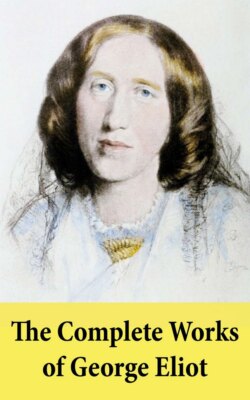Читать книгу The Complete Works of George Eliot - George Eliot - Страница 65
На сайте Литреса книга снята с продажи.
Chapter XXVIII.
ОглавлениеTable of Contents
It soon came—the blessed day of deliverance, the sad day of bereavement; and in the second week of March they carried him to the grave. He was buried as he had desired: there was no hearse, no mourning-coach; his coffin was borne by twelve of his humbler hearers, who relieved each other by turns. But he was followed by a long procession of mourning friends, women as well as men.
Slowly, amid deep silence, the dark stream passed along Orchard Street, where eighteen months before the Evangelical curate had been saluted with hooting and hisses. Mr. Jerome and Mr. Landor were the eldest pall-bearers; and behind the coffin, led by Mr. Tryan’s cousin, walked Janet, in quiet submissive sorrow. She could not feel that he was quite gone from her; the unseen world lay so very near her—it held all that had ever stirred the depths of anguish and joy within her.
It was a cloudy morning, and had been raining when they left Holly Mount; but as they walked, the sun broke out, and the clouds were rolling off in large masses when they entered the churchyard, and Mr. Walsh’s voice was heard saying, ‘I am the Resurrection and the Life’. The faces were not hard at this funeral; the burial-service was not a hollow form. Every heart there was filled with the memory of a man who, through a self-sacrificing life and in a painful death, had been sustained by the faith which fills that form with breath and substance.
When Janet left the grave, she did not return to Holly Mount; she went to her home in Orchard Street, where her mother was waiting to receive her. She said quite calmly, ‘Let us walk round the garden, mother.’ And they walked round in silence, with their hands clasped together, looking at the golden crocuses bright in the spring sunshine. Janet felt a deep stillness within. She thirsted for no pleasure; she craved no worldly good. She saw the years to come stretch before her like an autumn afternoon, filled with resigned memory. Life to her could never more have any eagerness; it was a solemn service of gratitude and patient effort. She walked in the presence of unseen witnesses—of the Divine love that had rescued her, of the human love that waited for its eternal repose until it had seen her endure to the end.
Janet is living still. Her black hair is grey, and her step is no longer buoyant; but the sweetness of her smile remains, the love is not gone from her eyes; and strangers sometimes ask, Who is that noble-looking elderly woman, that walks about holding a little boy by the hand? The little boy is the son of Janet’s adopted daughter, and Janet in her old age has children about her knees, and loving young arms round her neck.
There is a simple gravestone in Milby Churchyard, telling that in this spot lie the remains of Edgar Tryan, for two years officiating curate at the Paddiford Chapel-of-Ease, in this parish. It is a meagre memorial, and tells you simply that the man who lies there took upon him, faithfully or unfaithfully, the office of guide and instructor to his fellowmen.
But there is another memorial of Edgar Tryan, which bears a fuller record: it is Janet Dempster, rescued from self-despair, strengthened with divine hopes, and now looking back on years of purity and helpful labour. The man who has left such a memorial behind him, must have been one whose heart beat with true compassion, and whose lips were moved by fervent faith.
The End.
